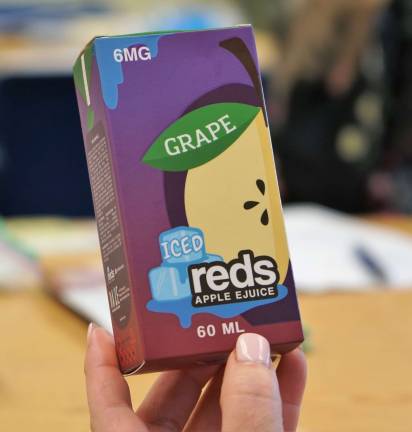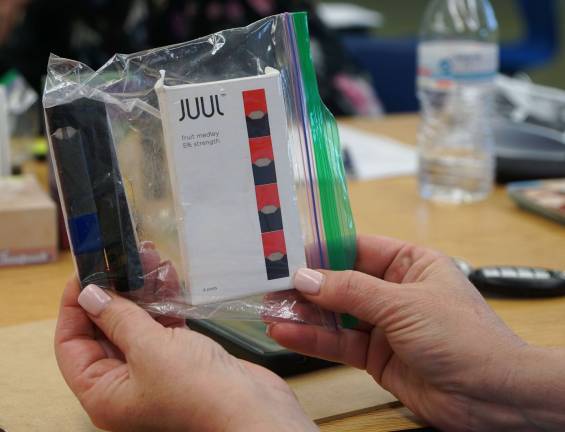Vernon Coalition discusses vaping


VERNON — What it considers the latest addictive technological dangers — e-cigarettes, vapes, and juuls — were reviewed on April 11 at the monthly Vernon Coalition meeting. Center for Prevention and Counseling School Specialist Ashley LeBelle's video presentation explained, due to a lack of regulation regarding advertising and ingredients, many toxic substances are found in e-products — not just flavoring: Rubidium helps color fireworks purple, Methanol is chemical found in rocket fuel, Formaldehyde preserves dead bodies, Ammonia is a cleaner, Carbon Monoxide, Arsenic is a poison, Butane is lighter fuel, Stearic Acid is a candle wax, paint, and Hexamine is a barbecue lighter.
She said many people are under the misconception that the vapor in e-cigarettes and vapes is water vapor. However, she explained, studies have proven there is actually zero H2O in the cloud vapor or e-juice inside the e-cigarette cartridges.
LeBelle reviewed the evolution of ENDS (Electronic Nicotine Delivery Systems) from First Generation, looking like traditional cigarettes, sold by major tobacco companies, and tested in clinical trials with pre-filled cartridges; to Second Generation: vape pens/small tube, user fills cartridge, and not sold by tobacco companies; to Third Generation: modifications or mods, refillable and programmable by USB port regarding the type of vapor, not sold by tobacco companies, and not tested in clinical trials.
Per a 2017 study, she said, only ten percent of 12th grade students had used tobacco in the last 30 days.
In contrast, National Institute on Drug Abuse, drugabuse.gov, statistics, she said, show: 12th grader e-cigarette use is up to 27.8 percent in 2017, from 12.5 percent in 2015; and eighth grade use is up to 13.3 percent in 2017, from 6.2 percent in 2015.
LeBelle said, 75 percent of eighth graders said only flavoring was in the e-vape mist, while 9 percent believed there was Nicotine. 2015 studies, she countered, found 99 percent of e-cigarette products, labeled Nicotine free, actually, contained Nicotine.
Juice boxes holding e-juice liquid, she said, are typically found at eye-level of five-year-old children in vape shops, thus, bringing down the perception of harm and likely encouraging them to try vapes when older. In addition, she said, there are more calls to poison control, because the e-juice containers look like juice box containers.
LeBelle also discussed dripping e-liquid on the heating component to create a bigger vapor; putting THC — the active ingredient in marijuana which causes the high X — in e-juices; and second hand vapor, when vapor and particles are inhaled involuntarily from e-cigarettes or vapes being smoked by others.
Due to third hand Nicotine — creating a residue which sticks to surfaces and causes dependency, she said, a N.J. bill prohibiting smoking tobacco, e-cigarettes, or vapes in the car around a minor under 18 years-old is currently pending.
N.J. law prohibits smoking, she said, including all electronic smoking devices, e-cigarettes, vapes, and tobacco, in all public areas, restaurants, hospitals, and schools. In addition, the new legal age for all e-cigarettes and tobacco products is 21 or older.
LeBelle also spoke of exploding e-cigarettes or e-vapes in pockets or hands, causing third degree burns. The battery she explained, overheats in a vapor modification, which is next to highly flammable chemicals.
Vernon Coalition Coordinator Rebecca Dorney showed empty e-juice containers, e-cigarettes, mods, and juuls – which look like flash drives. She said, vape names continue to change as more harms are known, in order to take away negative connotations. The latest, she continued, is juuling.
One juul cartridge, she said, has the comparable amount of Nicotine as a pack of cigarettes. Dorney continued, on average, it takes two packs of cigarettes to become addicted to Nicotine - 100 mg, to 200 mg.
Dorney also said, at this time, it appears New Jersey is not legalizing recreational marijuana. She explained, state Sen. Ronald Rice received Colorado and Washington state data and now believes legalizing recreational marijuana would harm the African American community. Currently, she said, he has a bill on the floor for decriminalization, adding, the coalition still needs to educate people, because there are not any safe substances for the developing brain.